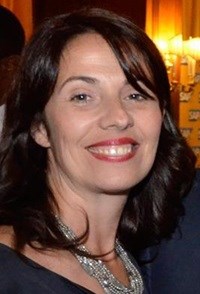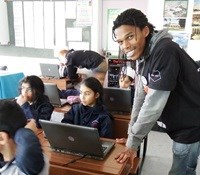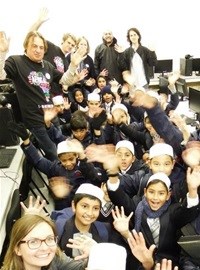I recently had the honour of attending the launch of Africa Code Week (ACW) at the Belmond Mount Nelson Hotel in Cape Town. ACW is a youth skills development programme targeted at 20,000 children in eleven African countries that will take place in October. SAP, Simplon.co, the Galway Education Centre and the Cape Town Science Centre is joining forces to teach the youth of Africa how to code. An invaluable skill, as coding is the language of the digital age and as one speaker noted, it is everywhere.
Addressing the lack of education
Because the African youth are the largest youth demographic across the globe, youth that will inevitably become the workforce of the world, it is of vital importance that they are trained and educated with skills that will equip them for the future. ACW aims to provide this training by hosting coding workshops for young people between the ages of 8 and 24 in countries that include South Africa, Angola, Cameroon, Egypt, Ivory Coast, Kenya, Morocco, Nigeria, Senegal, Togo and Tunisia.
ACW, in partnership with Simplon.co, the Galway Education Centre and the Cape Town Science Centre aims to empower not just the youth, but also their parents and teachers with programming language to assist in the proliferation of coding skills across the continent. Several speakers at the launch remarked that they cannot do it alone. Therefore, enabling these groups with the skills necessary to tackle the digital skills gap will aid in the overall success of the programme.
Making it easy and fun
If you're not an IT guru, programmer or gamer, the word 'coding' might send you running for the hills. A digital language (possibly a universal language in the future at the rate things are going) consisting of symbols, numbers and letters proves a challenge to those who don't know it well. That is why ACW will teach a basic code called 'scratch' that is freely available.
The best environment for children to learn in is a fun one. SAP in relation to FIRST Lego League identified that gamification (the application of elements of game playing) would create the best environment and aid in the absorption and retention of skills.
Basically, ACW will use 'scratch' to teach young people how to play. The idea is to get them "hooked" on programming.

Claire Gillissen-Duval
Before bringing coding literacy to Africa, ACW hosted a pilot programme in Cape Town last week. We had a talk with Claire Gillissen-Duval, director of EMEA Corporate Social Responsibility, Global Corporate Affairs, SAP SE, to see how it went.
The pilot for Africa Code Week was hosted in Cape Town last week. Any significant lessons learned regarding the programme, partners and participation?
Indeed. The pilot gave us a demonstration of how kids receive the Africa Code Week concept, and I can't begin to describe the joy I felt watching them having so much fun learning the ropes of coding! It also gave us a clear picture of best practices to spread across all countries, such as workshop length, maximum number of pupils in a classroom, etc.
A recurring question, for instance, was about the ideal teacher profile. Africa Code Week workshops are for children being targeted as beginners, and teachers/facilitators don't have to be professional programmers. It's more important to have a passion for sharing knowledge, the patience to answer questions and the empathy to understand a beginner's perspective. For larger events, it might also be a good idea to have a host that makes sure everyone has what they need and keep things running smoothly.
We are currently gathering all best practices in a dedicated partner guide to help schools, science centres, families, start-ups, hacker spaces, businesses, etc. to host their own workshops in October.
How will the Cape Town pilot week impact how Africa Code Week will be approached in October?
A second pilot should take place in September in a French-speaking African country, given that half of participating countries are French speaking. Replicating the South Africa pilot structure, this event will train teachers on how to organise their own coding workshops in October while children will be able to attend the very first coding workshops in French.
Then, from 1 Oct to 10 Oct, Africa Code Week will reach its full momentum with hundreds of live and online coding activities taking place all over Africa but also all over the internet! In December, several countries would host "Hour of Code" follow-up workshops to wrap-up the year and get ready for the next wave of live and online coding courses and activities to take place in 2016 in their respective communities.
How many teachers signed up to participate in training and educating the youth? Is there a continuous interest from people to participate as trainers?

A teacher from the Cape Town Science Centre in a classroom during the Africa Code Week pilot.
290 teachers were trained in just 48 hours, so it gives you a good idea of the buzz going on! We also get a lot of requests from teachers online, and we can already direct them to the openSAP MOOC "Teaching Programming to Young Learners" where they can receive training for free, wherever they are. This course is based around Scratch, a popular system adopted by millions of young learners worldwide as it fosters youthful curiosity, promotes creativity, and provides a basis for lifelong programming learning, free of charge.
Of all people, teachers are aware of the digital skills divide getting wider and wider in Africa. Although Africa has the largest and youngest workforce in the world, companies present on the continent today are struggling to fill IT-related positions with a local, qualified workforce. With the World Bank expecting 11 million youth to enter the African labour market every year over the next decade and knowing that digital skills will be the key to successful careers in the future, acting now is a must, and it all starts with simplifying the face of coding for children and facilitating lifelong programming learning right from primary school.
Once a teacher knows how to teach Scratch for instance, the coding workshop can easily become part of the everyday school life.
How many children were originally thought to participate and did there end up being more?
We initially targeted 200 children and 760 ended up attending a coding workshop... and it was just a pilot! Thanks to director Julie Cleverdon and her amazing staff at the Cape Town Science Centre, the demand for workshops clearly exceeded our expectations and we were able to host workshops in both urban and rural areas, as per the key engagement criteria outlined from day one by the Africa Code Week Steering Committee (SAP, Simplon.co, the Galway Education Centre and the Cape Town Science Centre).

Pupils from the Islamia Primary School in Landsdowne, South Africa – thrilled with their first coding experience!
Did the children who participated in the initiative find coding simple enough or did they struggle a bit?
Easy as 123! You would not believe the creations they were able to share after just one hour of clicking, dragging and dropping! Scratch is a wonderful learning tool for children. Developed by the MIT Media Lab, it really sparks interest in creative computing through hands-on, playful learning, allowing kids to program their own interactive stories, games, and animations using a very intuitive interface.
Entirely free of charge, Scratch really makes coding accessible to anyone, to the point where it is now being used by millions of kids around the world. Last but not least, Scratch also helps young people learn to think creatively, reason systematically and work collaboratively, which are critical skills and the new job currency in the 21st century workforce.
What is the general attitude toward the success of the initiative after the pilot week?
Beyond encouraging! By showing how easy it is to learn coding and by making learning materials freely accessible to both teachers and pupils, Africa Code Week is a powerful way to spread digital literacy across the continent and start building the skilled workforce needed for Africa's IT sector. On 29 May, we even gathered celebrities - the majority of which had no coding experience - and asked them to take up the challenge. They could not believe how easy it was to code a little game animation in less than an hour.
But spreading digital literacy in the 21st century cannot happen without a proper digital learning platform. That's why most Africa Code Week courses and learning materials will be available on the openSAP platform, entirely free of charge, to all teachers, kids and youth, wherever they are in the world. This is the key multiplier that will allow Africa Code Week to become sustainable and meet its ambitious goal of empowering 225,000+ teachers and positively impacting the lives of ten million kids and youth within the next 10 years.
For more information and to get involved visit Africa Code Week.








































